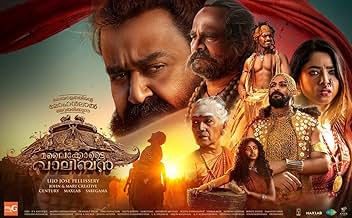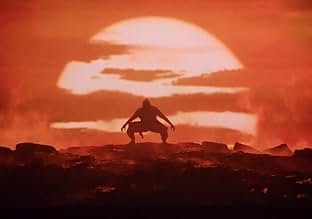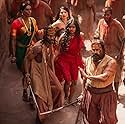IMDb-BEWERTUNG
6,0/10
4204
IHRE BEWERTUNG
Die Reise des Malaikottai Vaaliban, eines unangefochtenen Kriegers, der Zeit und Geografie überwindet und über jeden Gegner triumphiert, dem er begegnet.Die Reise des Malaikottai Vaaliban, eines unangefochtenen Kriegers, der Zeit und Geografie überwindet und über jeden Gegner triumphiert, dem er begegnet.Die Reise des Malaikottai Vaaliban, eines unangefochtenen Kriegers, der Zeit und Geografie überwindet und über jeden Gegner triumphiert, dem er begegnet.
- Regie
- Drehbuch
- Hauptbesetzung
- Auszeichnungen
- 1 Nominierung insgesamt
Grace Antony
- Rangarani
- (Synchronisation)
Empfohlene Bewertungen
The folklore of the beast.
(grandma narrating a mythical story)
Firstly, I contend that this film may not significantly impact the box office, primarily due to the preferences of the Malayali audience. While it's true that there has been a growing acceptance of art in cinema, those very individuals who appreciate artistic endeavors seem unwilling to forego the mass appeal and adrenaline-filled moments associated with their favorite actors, Mohanlal being a prominent example.
There is an expectation for something markedly different, but the audience often becomes fatigued and concludes that the film falls short of expectations. Some argue that watching an LJP movie is not everyone's cup of tea, and the notion that the major audience deems it as such is dismissed as an excuse to distance themselves from what they perceive as a subpar cinematic experience.
Personally, I attended the theatrical screening solely for one reason - LJP. Having previously admired his work, I was convinced that if anyone in the Malayalam film industry prioritizes art over commercial gains, it would be LJP. The collaboration with one of Mollywood's biggest stars, Mohanlal, intrigued me, and I was eager to witness how this pairing would fare.
To my delight, the usual rawness characteristic of LJP's films was notably absent in this production. He had undergone a transformation, evolving into something even more refined. The cinematic canvas presented by the film instilled in me a renewed sense of hope that Malayalis possess elements that Hollywood lacks. Rather than attempting to mimic, LJP crafted something distinctly his own - from the plot and characters to the narrative structure, underscored by a captivating background score and exceptional cinematography.
The film evoked a sensation similiar to the enchantment experienced during childhood when grandparents narrated mythical stories. The suspense, love, tragedy, and action encapsulated in the movie echoed the emotional resonance of those tales.
However, I must acknowledge a couple of setbacks: the dialogues, at times, felt artificial, disrupting the immersive environment the film was building. The frequent change in the style of the movie, changing from a static shot to an action disrupting the consistency. Additionally, the abundance of songs, while not inherently objectionable, risked veering towards a musical rather than maintaining the essence of an LJP film. They tried to convey many stories in a novel like fashion but it may make the viewer that something is lagging behind .
While further delving into the artistry without revealing the plot proves challenging, "Malaikotta Valiban" is certainly a folklore of the beast.
(grandma narrating a mythical story)
Firstly, I contend that this film may not significantly impact the box office, primarily due to the preferences of the Malayali audience. While it's true that there has been a growing acceptance of art in cinema, those very individuals who appreciate artistic endeavors seem unwilling to forego the mass appeal and adrenaline-filled moments associated with their favorite actors, Mohanlal being a prominent example.
There is an expectation for something markedly different, but the audience often becomes fatigued and concludes that the film falls short of expectations. Some argue that watching an LJP movie is not everyone's cup of tea, and the notion that the major audience deems it as such is dismissed as an excuse to distance themselves from what they perceive as a subpar cinematic experience.
Personally, I attended the theatrical screening solely for one reason - LJP. Having previously admired his work, I was convinced that if anyone in the Malayalam film industry prioritizes art over commercial gains, it would be LJP. The collaboration with one of Mollywood's biggest stars, Mohanlal, intrigued me, and I was eager to witness how this pairing would fare.
To my delight, the usual rawness characteristic of LJP's films was notably absent in this production. He had undergone a transformation, evolving into something even more refined. The cinematic canvas presented by the film instilled in me a renewed sense of hope that Malayalis possess elements that Hollywood lacks. Rather than attempting to mimic, LJP crafted something distinctly his own - from the plot and characters to the narrative structure, underscored by a captivating background score and exceptional cinematography.
The film evoked a sensation similiar to the enchantment experienced during childhood when grandparents narrated mythical stories. The suspense, love, tragedy, and action encapsulated in the movie echoed the emotional resonance of those tales.
However, I must acknowledge a couple of setbacks: the dialogues, at times, felt artificial, disrupting the immersive environment the film was building. The frequent change in the style of the movie, changing from a static shot to an action disrupting the consistency. Additionally, the abundance of songs, while not inherently objectionable, risked veering towards a musical rather than maintaining the essence of an LJP film. They tried to convey many stories in a novel like fashion but it may make the viewer that something is lagging behind .
While further delving into the artistry without revealing the plot proves challenging, "Malaikotta Valiban" is certainly a folklore of the beast.
It took me a good 30 minutes or so to get sucked into the mystical universe of Malaikottai Vaaliban. Still, once I did, I'm guessing I enjoyed it more than 90% of the audience.. gauging from the varied reactions at the cinema hall. This film marries the sensibilities of a large-scale Puranic opera with the narrative style of a Kurosawa Samurai flick and the visuals of a Sergio Leone western. Since we've seen how much the hype train has damaged a Mohanlal film in recent times, I chose to largely disregard the "claims" made in the promotional interviews in the run-up to its release. And that helped. Knowing I had sat down for an LJP directorial was enough assurance of the film being inherently unpredictable and not your regular fast-paced crowd-pleaser.
This helped me appreciate Madhu Neelakantan's postcard-like frames a lot more (especially the extended static shots that bored most viewers). Yes, they did feel as overindulgent as LJP's use of slow-motion in the action blocks. But I was already sold. This bizarre universe, its distinct plot developments, and oddball characters gradually grew on me. The sudden shifts in tone (from soapy to violent to farcical to philosophical), Prashant Pillai's use of folk instruments to underline some of the set pieces, and even the stupid love-plus-revenge-triangle in the second half, which normally would have killed even the tiniest bit of interest in me - I was able to digest most of it. That said, I did not feel vehemently connected to any of the characters including the protagonist, and it was the aura created through sheer audio-visual magic that kept me fascinated.
Malaikottai Vaaliban heavily invokes the feeling of reading an Indian comic book based on local legends, and LJP has tried to play it to his strengths. It hasn't really fired on all cylinders, but I'd still appreciate him for not half-arsing it. The work of the art & production design departments is essential in letting you connect with the lore of this particular land. P S Rafeeque's writing works when it's busy building to a key moment, but is archaic as hell when it revolves around the tropes of romance or lust. The female characters (and the transwoman), especially, are poorly etched. The colonists are too caricaturish, reminding you of LJP's own Double Barrel. When the film finally poses a pertinent question on an indomitable warrior's existential crisis, it gets too busy building to a sequel that may not even happen. Argh, why even bother?
This helped me appreciate Madhu Neelakantan's postcard-like frames a lot more (especially the extended static shots that bored most viewers). Yes, they did feel as overindulgent as LJP's use of slow-motion in the action blocks. But I was already sold. This bizarre universe, its distinct plot developments, and oddball characters gradually grew on me. The sudden shifts in tone (from soapy to violent to farcical to philosophical), Prashant Pillai's use of folk instruments to underline some of the set pieces, and even the stupid love-plus-revenge-triangle in the second half, which normally would have killed even the tiniest bit of interest in me - I was able to digest most of it. That said, I did not feel vehemently connected to any of the characters including the protagonist, and it was the aura created through sheer audio-visual magic that kept me fascinated.
Malaikottai Vaaliban heavily invokes the feeling of reading an Indian comic book based on local legends, and LJP has tried to play it to his strengths. It hasn't really fired on all cylinders, but I'd still appreciate him for not half-arsing it. The work of the art & production design departments is essential in letting you connect with the lore of this particular land. P S Rafeeque's writing works when it's busy building to a key moment, but is archaic as hell when it revolves around the tropes of romance or lust. The female characters (and the transwoman), especially, are poorly etched. The colonists are too caricaturish, reminding you of LJP's own Double Barrel. When the film finally poses a pertinent question on an indomitable warrior's existential crisis, it gets too busy building to a sequel that may not even happen. Argh, why even bother?
A well shot movie. A beautiful, picturesque folklore with philosophical underlying if you linger a bit longer on it... Each frame looks like a painting so fresh from the canvas. The score too takes a high with ethnic tunes and instruments. Especially the bgm during a major fight scene was so novel and enjoyable. All the actors have done justice to their characters. Mohanlal's age defying stunts are to look out for. His reactions to certain situations remind us why he is called the 'complete actor'. The antagonist played by Danish Sait is fantastic. This movie is a visual treat. Technically brilliant! Do remember that it is an LJP movie. You'll love it if you love cinema.
Malaikottai Vaaliban follows Vaaliban(Mohanlal) and his group of mercenaries/warriors who fight other warriors in different villages and who never loses a fight. Lijo Jose Pellissey takes his own time to establish Vaaliban as a charismatic warrior with his lengthy scenes and long shots embellished with a subdued background music. The framing, the music and the theme reminds the westerners of yore. Vaaliban ends up at his native village where he fights off the Portuguese ruler who enslaves the local people. The story moves at brisk pace from here on exploring various genres with some unexpected twists, albeit uninteresting, and culminates at an inconclusive juncture.
Lijo Jose Pellissery's obsession with static frames is evident here. The movie plays out like a theater play with long pauses between scenes and overly melodramatic dialogue. The choice of instruments used to provide the background score elevates this feeling which you may love or hate depending on your mood. The movie feels like it overstayed its welcome after a certain point.
Mohanlal as Vaaliban shines with his ever-expressive eyes and flawless portrayal of an arrogant mercenary. Harish Peradi gets an important and meaty role as Vaaliban's mentor which he portrays with finesse. The true star of the movie is the cinematographer Madhu Neelakandan who captivates the audiences with his immersive frames and color. You rarely say that camera work is the main highlight of a movie, and this is one of those.
But in the end, as the saying goes, even the best technicians cannot save a movie with barely any story to hold on to.
Lijo Jose Pellissery's obsession with static frames is evident here. The movie plays out like a theater play with long pauses between scenes and overly melodramatic dialogue. The choice of instruments used to provide the background score elevates this feeling which you may love or hate depending on your mood. The movie feels like it overstayed its welcome after a certain point.
Mohanlal as Vaaliban shines with his ever-expressive eyes and flawless portrayal of an arrogant mercenary. Harish Peradi gets an important and meaty role as Vaaliban's mentor which he portrays with finesse. The true star of the movie is the cinematographer Madhu Neelakandan who captivates the audiences with his immersive frames and color. You rarely say that camera work is the main highlight of a movie, and this is one of those.
But in the end, as the saying goes, even the best technicians cannot save a movie with barely any story to hold on to.
What If Quentin Tarantino made an Indian movie ? Yes. That's exactly what "Malaikottai Valiban" is on screen.
Brilliantly woven piece, the movie begins where you think it ends. The amazing plot twist will keep you in edge of the seat. LJP's story telling is always unique, the Malaikottai Valiban is like a video game, where you finish one lever after other each one more daunting than the previous and at the end one final big mission which looks impossible with an absolute plot twist.
The movie is filled with wide angle shots and landscapes, Madhu Neelakandan's cinematography is really brilliant. I loved it personally.
It's not a movie for Mohan Lal's fan, it won't have extravagant intro, it's a movie made according to what the story really wants and that makes the movie absolutely a masterpiece.
Danish Sait will bag multiple awards for his role for sure, and I have no doubt it. You can see a director's real talent when you see Danish acting in this movie.
Overall this movie is an art of Indian cinema, LJP has done it again.
Brilliantly woven piece, the movie begins where you think it ends. The amazing plot twist will keep you in edge of the seat. LJP's story telling is always unique, the Malaikottai Valiban is like a video game, where you finish one lever after other each one more daunting than the previous and at the end one final big mission which looks impossible with an absolute plot twist.
The movie is filled with wide angle shots and landscapes, Madhu Neelakandan's cinematography is really brilliant. I loved it personally.
It's not a movie for Mohan Lal's fan, it won't have extravagant intro, it's a movie made according to what the story really wants and that makes the movie absolutely a masterpiece.
Danish Sait will bag multiple awards for his role for sure, and I have no doubt it. You can see a director's real talent when you see Danish acting in this movie.
Overall this movie is an art of Indian cinema, LJP has done it again.
Wusstest du schon
- WissenswertesMohanlal's voice was dubbed by filmmaker Anurag Kashyap in the Hindi dubbed version of the film.
Top-Auswahl
Melde dich zum Bewerten an und greife auf die Watchlist für personalisierte Empfehlungen zu.
- How long is Malaikottai Vaaliban?Powered by Alexa
Details
- Erscheinungsdatum
- Herkunftsland
- Offizieller Standort
- Sprache
- Auch bekannt als
- मलाइकोट्टई वालिबन
- Drehorte
- Produktionsfirmen
- Weitere beteiligte Unternehmen bei IMDbPro anzeigen
Box Office
- Weltweiter Bruttoertrag
- 808.435 $
- Laufzeit
- 2 Std. 36 Min.(156 min)
- Farbe
- Seitenverhältnis
- 2.39 : 1
Zu dieser Seite beitragen
Bearbeitung vorschlagen oder fehlenden Inhalt hinzufügen



















